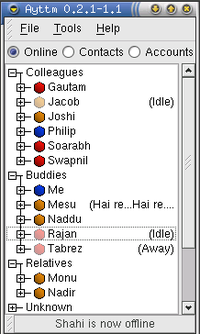Features
Services
Ayttm primarily supports one-to-one and group chatting on MSN, Yahoo!, ICQ, AIM, XMPP and IRC. It also has support for sending rudimentary emails via SMTP, which may be used to send SMS via email to SMS gateways. Ayttm also supports webcams on Yahoo! Messenger, and voice chatting over MSN using Ekiga (formerly GnomeMeeting).
Service summary:
Fallback messaging
When contacts belonging to the same person - but in different protocols - are grouped together, Ayttm can automatically continue the conversation using another protocol, when the original protocol connection fails. It is known as fallback messaging to its developers.
Autotranslation
When a contact is tied to a particular language, messages can be automatically translated using Babelfish. As with most electronic translators, its accuracy can be dubious.
Aycryption
Aycryption is a filter that facilitates encrypted chat using GPG keys. All outgoing text is encrypted using the remote contact's public key, and incoming encrypted text is decrypted using the local private key.
Plugins
Ayttm's plugin architecture makes it possible for new protocol support to be added without modifying the core application. Plugins must be compiled against a version of the core and will only work with core versions that are binary-compatible with the core version that the plugin was built against.
Five types of plugins are supported:
- Service plugins - for protocol support. e.g.: MSN.
- Filter plugins - to modify incoming and outgoing messages. e.g.: Auto translation, aycryption
- Importers - to import contacts and accounts from other messengers.
- Smileys - a smiley pack
- Utility - to add functionality. e.g.: Video capture, notes.
History
Towards the end of 2002, the everybuddy project started to stagnate and suffered from two major problems: Instability and a complicated set of preferences. The development team split into two to fix the problem. One group, led by Meredydd Luff started on a rewrite that was to be the long-term solution. This resulted in the eb-lite project. The other group led by Colin Leroy decided to fix all of the primary issues of everybuddy and work on features only after stabilising the core. The result was Ayttm. [3]
Ayttm first made it into savannah's CVS repository on December 21, 2002, and almost daily developer releases were made: [4] It was first announced on Freshmeat on December 27, 2002.
On March 31, 2003, citing availability issues with Savannah, the project was moved to SourceForge where it remains to date. [5] Version 0.2.2 of Ayttm was released on April 1, 2003. [6]
The latest release of Ayttm is 0.6.3 and was made on July 10, 2010. [7]
This page is based on this
Wikipedia article Text is available under the
CC BY-SA 4.0 license; additional terms may apply.
Images, videos and audio are available under their respective licenses.
